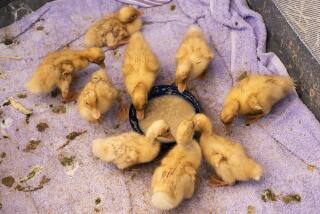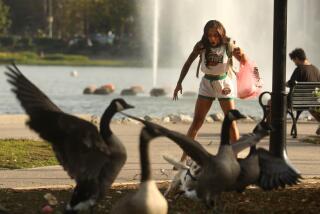City’s Request: Please Don’t Feed Ducks
- Share via
Mother Nature and zealous feeders are causing the demise of ducks at what remains of Talbert Lake in Huntington Beach, and city officials say there’s little they can do to reverse the process.
In the past several months, the Central Park lake has steadily shrunk because of the hot weather and a scarcity of rain, said Daryl Smith, the park’s maintenance superintendent.
As the lake evaporates, he said, the oxygen level decreases and decay occurs. Uneaten pieces of bread that have sunk to the bottom are then in an atmosphere conducive to the growth of a form of avian botulism.
Also known as limpneck, avian botulism attacks water fowls’ cardiovascular and respiratory systems, paralyzing them within 24 hours. Soon they die. In the last four weeks, about 22 ducks have died after becoming infected in the lake’s murky waters, Smith said.
Park officials are discouraging feeding and trying to scare away the surviving ducks, but both efforts have had limited success.
The ducks have enough natural food, and feeding encourages them to stay at the lake instead of migrating north as they should in the summer, city spokesman Bill Reed said.
He called the lake’s receding cycle “part of Mother Nature’s scheme.”
“There’s not much you can do,” he said, except to “just ask people not to feed the ducks and pray for rain.”
“We interfere when we artificially feed the ducks. The trouble comes with people who think they’re helping the ducks. There’s plenty of food or the ducks wouldn’t be there. They become resident ducks largely because of the handouts.”
On Wednesday, several people tossed bread to about 25 ducks at a pond near the lake--despite signs that asked them not to.
By Monday, the lake had shrunk from its normal depth of about three feet to less than a foot. The botulism occurs yearly, but the heat has made it worse this year, Reed said.
“The lake right now is virtually dry, and it will dry out by next week completely,” he said. “The problem is it’s a natural situation.”
Some people have suggested that the city seal the lake’s bottom, but that would probably cause flooding when the lake refills in the winter, Reed said. And when the lake does exist again, “the children will be sitting out there feeding the ducks again,” he said.
Infected ducks could spread the disease to untainted bodies of water.
But Sharon Game, resident manager of nearby Huntington Lakes, said ducks there showed no indication of being infected with botulism before they flew away several days ago.
Meanwhile, Smith is encouraging the City Council to pass a law prohibiting feeding that harms wildlife or the park’s atmosphere.
He has also proposed deepening of the lake so it can hold more water, but that project would cost about $1 million.
More to Read
Sign up for Essential California
The most important California stories and recommendations in your inbox every morning.
You may occasionally receive promotional content from the Los Angeles Times.










